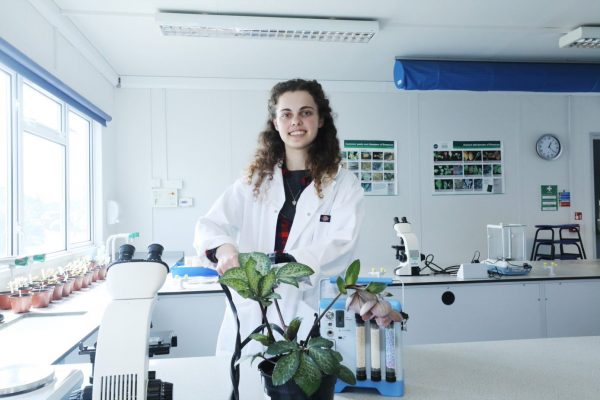Ecologist (degree) ST0577
Eden Project University Centre Cornwall College - as required
Eden Project University Centre Cornwall College - as required
Level 7 Levels Explained
Typically 2.5 years
Marine & Natural Environment Find out more
Work-based
Ecologist (degree) ST0577
 There is a crisis in the ecology sector with too few suitably experienced ecologists to oversee UK biodiversity policies. There is also a need for ecologists to embrace and understand changing priorities and legislation, with significant opportunities for the UK sector to learn from international standards and best practice in ecological restoration.
There is a crisis in the ecology sector with too few suitably experienced ecologists to oversee UK biodiversity policies. There is also a need for ecologists to embrace and understand changing priorities and legislation, with significant opportunities for the UK sector to learn from international standards and best practice in ecological restoration.
The Level 7 Ecologist Apprenticeship is designed to provide an accessible work-based learning route as an alternative to a traditional university model, for employers to recruit and develop ecologists in their organisation. At the start of the UN Decade on Ecosystem Restoration we must to do more than mitigate against further ecological deterioration by actively restoring damaged and destroyed habitats to protect and increase biodiversity and enhance ecosystem services - this requires skilled professionals to lead #GenerationRestoration.
The MSc Land and Ecological Restoration embedded within the apprenticeship standard aims to develop a thorough understanding of how to set success criteria and identify restoration priorities, engage stakeholders, plan, implement and monitor programmes of restoration, evaluate the success of activities, and plan aftercare. A significant advantage of the apprenticeship delivery model is the opportunity for enhanced knowledge exchange as apprentices from diverse backgrounds share their experiences with each other, with their tutors, and with their employers. Apprentices at Eden Project Learning will learn from professional UK ecologists and engage with a global community of restoration practitioners. Key principles and standards developed by professional bodies including the Chartered Institute of Ecology (CIEEM) and Society for Ecological Restoration (SER) are embedded in the programme to prepare apprentices for professional recognition.
Duration - Typically 2.5 years. Apprentices must complete MSc Land and Ecological Restoration part-time over two years to be eligible for End Point Assessment, which usually takes place within six months of graduation. The MSc is taught as four residential field courses to Cornwall (one week in April / May and one in Sept of each year of the apprenticeship), with a morning of online learning during term-time of the 30 week Higher Education year.
What you will learn
Apprentices complete six 20-credit taught modules followed by a substantial 60-credit research project. Taught modules are designed to develop a thorough understanding of the theoretical framework underpinning practical techniques together with the project management and employability competencies necessary to lead and contribute to restoration activities in the UK.
Taught modules include: Planning and Implementing a Restoration Programme, Principles and Practice of Ecological Restoration, Biosecurity and Invasive Species Management, Postgraduate Research Methods, GIS and Survey Techniques, and Wetland Ecosystem and Riparian Restoration. A research project completed in the second year of the apprenticeship provides an opportunity for apprentices to focus on an area of interest shared with their employer, such as trialling and evaluating practical techniques for mitigation or monitoring, reviewing policy and updating organisational procedures and strategy, or developing new best practice methods for engaging stakeholders. The research might take the form of a true experiment or field investigation, a systematic literature review, or social science research involving stakeholders.
Apprentices will be supported throughout their research with 1-to-1 supervision. Apprentices must develop and demonstrate competence in the 26 core areas detailed in the apprenticeship standard (https://www.instituteforapprenticeships.org/apprenticeship-standards/ecologist-degree-v1-0). These include the knowledge, skills and behaviours required to work as a fully competent ecologist. In addition, apprentices choose from one of three specialist options and demonstrate competence in another 8 - 10 areas specific to their job role as either an Ecological Scientist, a Landscape Ecologist, or a Consultant Ecologist. For example an Ecological Scientist might work in academia, a research organisation or statutory agency and would produce, review, analyse and disseminate data and information. Specialist competencies place an emphasis on the analysis and presentation of data and how evidence should inform policy development.
A Landscape Ecologist would work in a multidisciplinary team, such as a Local Authority or NGO, using ecological and other data to develop strategies and policies. Specialist competencies include an enhanced focus on spatial analysis and mapping. A Consultant Ecologist may work in a specialist ecological consultancy or a large organisation, such as an engineering company, requiring ecological skills for their core business. Typically, consultants will liaise directly with clients, undertake field-based site investigations, interpret the findings and report these back to the client. Specialist competences include a focus on planning legislation, licensing and statutory requirements such as mitigation and biodiversity net gain.
Entry requirements
A good honours degree (minimum 2:2) or equivalent in a relevant discipline. Candidates with an unrelated Level 6 qualification with work experience in a relevant area are also encouraged to apply.
Additionally, candidates need a minimum Level 2 qualification in English and maths, candidates without Level 2 qualification in English and maths will need to achieve this level prior to end-point assessment.
Individual employers will set the selection criteria for their apprentices.
Assessment
There are two assessments for each of the six 20-credit taught modules of the MSc, followed by a 60-credit research project. The varied and balanced diet of assessment includes case study reports, live employer briefs, individual and group oral presentations, poster presentations, and the production of databases and map outputs. On completion of the MSc, apprentices are eligible for End Point Assessment consisting of a viva (supported by on-programme portfolio), a practical demonstration, and a report and presentation. End Point Assessment is conducted by an approved organisation external to the training provider; currently the Chartered Institute of Ecology and Environmental Management (CIEEM).
Progression
On completion, apprentices will be fully competent ecologists able to work in a wide range of organisations including, ecological consultancy, local authorities, Non-Governmental Organisations, government agencies, and research. Graduates may be able to progress to more senior roles with their employer and will be well prepared to undertake a PhD. On completion, apprentices will be eligible for the appropriate level of membership of several professional bodies including the Chartered Institute of Ecology and Environmental Management (CIEEM) and the Society for Ecological Restoration (SER).

Eden Project University Centre Cornwall College
Part of The Cornwall College Group. In partnership with the Eden Project, we have developed a unique set of university-level degrees taught on-site at Eden, to complement Eden’s ethos of making the world a better place. Taught by Cornwall College’s expert trainers in the Eden Project’s unique learning environment, Eden Project Learning students have the opportunity to study for a university-level degree, awarded by Plymouth University, alongside experiencing hands-on practical experience at a world-famous visitor attraction and garden. Find out more at our next Open Day.
Visiting our Eden campus? View our visitor information
Taught modules include: Planning and Implementing a Restoration Programme, Principles and Practice of Ecological Restoration, Biosecurity and Invasive Species Management, Postgraduate Research Methods, GIS and Survey Techniques, and Wetland Ecosystem and Riparian Restoration. A research project completed in the second year of the apprenticeship provides an opportunity for apprentices to focus on an area of interest shared with their employer, such as trialling and evaluating practical techniques for mitigation or monitoring, reviewing policy and updating organisational procedures and strategy, or developing new best practice methods for engaging stakeholders. The research might take the form of a true experiment or field investigation, a systematic literature review, or social science research involving stakeholders.
Apprentices will be supported throughout their research with 1-to-1 supervision. Apprentices must develop and demonstrate competence in the 26 core areas detailed in the apprenticeship standard (https://www.instituteforapprenticeships.org/apprenticeship-standards/ecologist-degree-v1-0). These include the knowledge, skills and behaviours required to work as a fully competent ecologist. In addition, apprentices choose from one of three specialist options and demonstrate competence in another 8 - 10 areas specific to their job role as either an Ecological Scientist, a Landscape Ecologist, or a Consultant Ecologist. For example an Ecological Scientist might work in academia, a research organisation or statutory agency and would produce, review, analyse and disseminate data and information. Specialist competencies place an emphasis on the analysis and presentation of data and how evidence should inform policy development.
A Landscape Ecologist would work in a multidisciplinary team, such as a Local Authority or NGO, using ecological and other data to develop strategies and policies. Specialist competencies include an enhanced focus on spatial analysis and mapping. A Consultant Ecologist may work in a specialist ecological consultancy or a large organisation, such as an engineering company, requiring ecological skills for their core business. Typically, consultants will liaise directly with clients, undertake field-based site investigations, interpret the findings and report these back to the client. Specialist competences include a focus on planning legislation, licensing and statutory requirements such as mitigation and biodiversity net gain.
Additionally, candidates need a minimum Level 2 qualification in English and maths, candidates without Level 2 qualification in English and maths will need to achieve this level prior to end-point assessment.
Individual employers will set the selection criteria for their apprentices.

Eden Project University Centre Cornwall College
Part of The Cornwall College Group. In partnership with the Eden Project, we have developed a unique set of university-level degrees taught on-site at Eden, to complement Eden’s ethos of making the world a better place. Taught by Cornwall College’s expert trainers in the Eden Project’s unique learning environment, Eden Project Learning students have the opportunity to study for a university-level degree, awarded by Plymouth University, alongside experiencing hands-on practical experience at a world-famous visitor attraction and garden. Find out more at our next Open Day.
Visiting our Eden campus? View our visitor information
Related Topics
Dates & Locations
- Location - Eden Project University Centre Cornwall College
- Start Date - As required
- Tuition Fees: Tuition Fees: £0.00*
*Please note - Fees apply to adults and HE students only. Only the most common fees scenario is shown. Actual fees may vary depending on your personal situation. Please contact us for further information.
MORE INFORMATION ON FINANCIAL SUPPORT
Information for School Leavers
Information for ages 19+ - Apply Now
- Location - Eden Project University Centre Cornwall College
- Start Date - As required
- Tuition Fees: Tuition Fees: £0.00*
*Please note - Fees apply to adults and HE students only. Only the most common fees scenario is shown. Actual fees may vary depending on your personal situation. Please contact us for further information.
MORE INFORMATION ON FINANCIAL SUPPORT
Information for School Leavers
Information for ages 19+ - Apply Now
Course Code 10047-EDN-00, 10047-EDN-00
Fees apply to adults and HE students only. Only the most common fees scenario is shown. Actual fees may vary depending on your personal situation. Please contact us for further information.
Courses listed on this website are indicative of the subject, nature and level of study. The College reserves the right to alter specific qualifications titles, awarding bodies and levels of qualification, which can change in year. Any cost may also vary, based on personal funding eligibility. The Cornwall College Group reserves the right to withdraw any course listed at any time.






